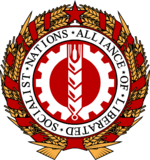Tricontinental Alliance
This article is incomplete because it is pending further input from participants, or it is a work-in-progress by one author. Please comment on this article's talk page to share your input, comments and questions. Note: To contribute to this article, you may need to seek help from the author(s) of this page. |
 Emblem of the Tricontinental Alliance | |
Flag of the Tricontinental Alliance | |
| Abbreviation |
|
|---|---|
| Nickname | Tricontinental Alliance |
| Motto | “The movement marches over those who stand in the way.” |
| Formation | 1 May 1984 |
| Founders | Shadoveil Montilla Sukong |
| Legal status | Intergovernmental political and military alliance |
| Purpose | Increase cooperation between socialist states |
| Headquarters | Innä, Shadoveil |
Region | |
Membership | |
Official language | |
| TBD | |
| TBD | |
Main organ | Council of the Tricontinental |
| Affiliations | Tricontinental Space Agency |
The Tricontinental Alliance (TA), formally the Alliance of Liberated Socialist Nations (ALISONA), is an intergovernmental military and political alliance between Montilla, Sukong and Shadoveil. The alliance came into effect after the signing of the Treaty of Cinco Caminos on the 1st of May of 1984, with the objective of increasing cooperation between the three socialist powers and for mutual defense in case of foreign aggression.
History
Foundation
Membership
Full members
| Name |
Official name |
Accession date |
Continent |
Capital |
Area (km2) |
Population |
Density (per km2) |
Currency |
Official languages |
|---|---|---|---|---|---|---|---|---|---|
| Union of Sivuk Workers' Republics (Fulin Vugsoyedasevfukesadesenses) |
1 May 1984 | Thuadia | Innä | 1,795,553 | 124,299,010 | 223.33 | Inkush | Various | |
| People's Republic of Montilla (República Popular de la Montilla) |
1 May 1984 | Hiraethia | Guaitiao | 117.628 | 19,127,519 | 162.61 | Peso | Spanish | |
| Federated Socialist States of Sukong (綠國聯赤邦) |
1 May 1984 | Olivacia | Ca Luo | 822,167 | 341,036,187 | 412 | Yen | Sukong |
Structure
Council of the Tricontinental
The main organ of the Tricontinental Alliance is the Council of the Tricontinental, which votes on resolutions of collective interest to all members. Every member has three seats in the council, one for the head of state, one for the defence minister or equivalent and one for the foreign minister or equivalent. Despite being entitled to three seats, each member has one vote, with no veto power.
Resolutions are divided in two categories: extraordinary and ordinary. Extraordinary resolutions demand an unanimous vote with presential participation of all seats to be passed. Ordinary resolutions demand a simple majority (2 out of 3) vote to be passed, and does not require presential participation of all seats since 2010, being allowed either virtual or presential participation.
Sessions of the Council happen semesterly, with presential participation of all seats being obligatory. Emergency sessions can be called by the General Secretary upon agreement of two or more members.